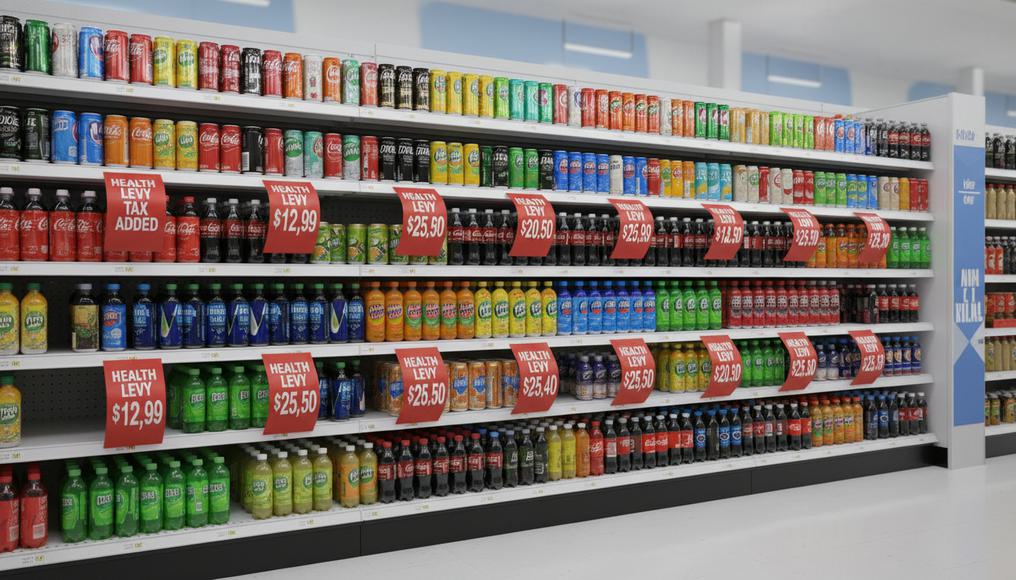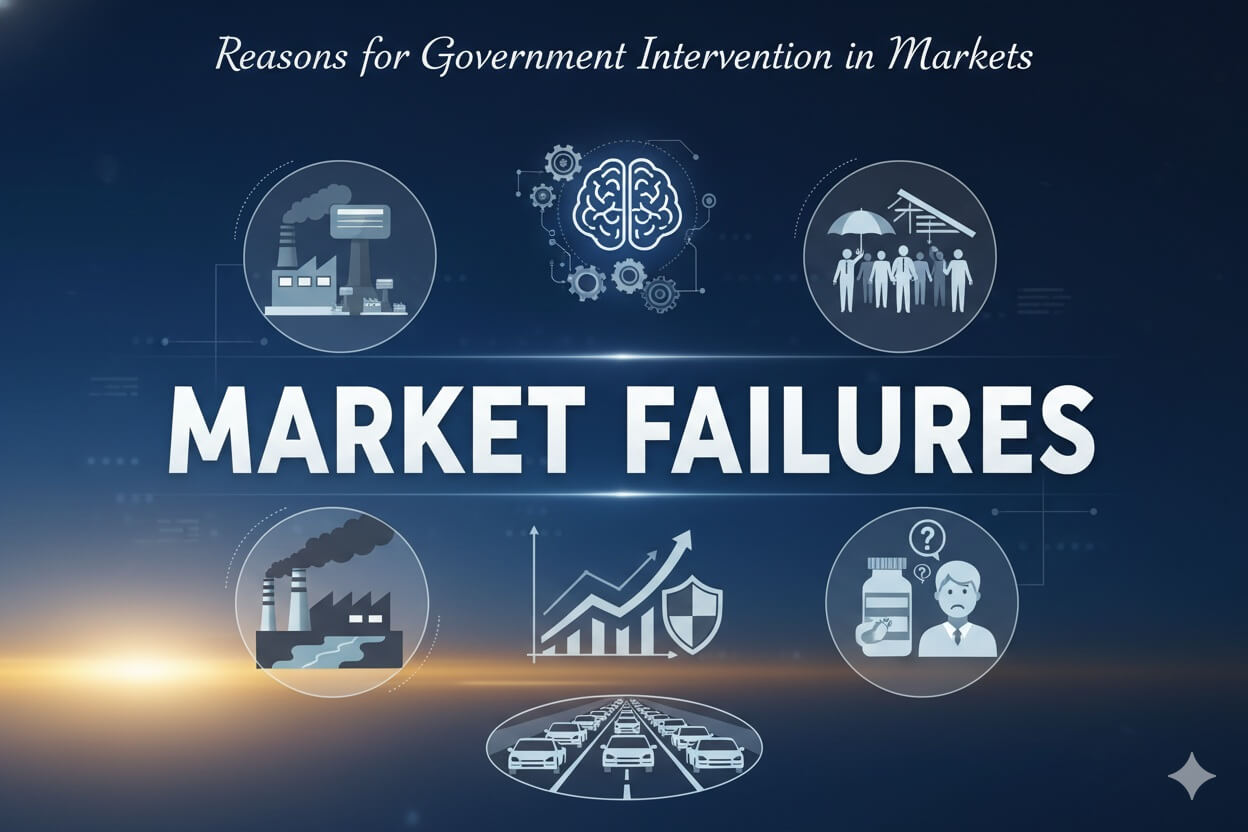Why Governments Step Into Free Markets (And Why It’s Essential)
Imagine the free market as a massive party where everyone’s grabbing free snacks like national defense, guzzling endless sugary drinks, and skipping the healthy stuff like education. Total chaos—spills, health disasters, and no one footing the bill. Enter the government, the responsible adult fixing addressing the non-provision of public goods, tackling addressing the over-consumption of demerit goods and the under-consumption of merit goods, and implementing controlling prices in markets. Without this intervention, we’d be vulnerable to threats and health crises. Buckle up—A-Level beginners, this guide makes market failure fun, not textbook-drudgery. For a broader intro to these concepts, check our Government Intervention in Markets: Essential Guide for A-Level Economics Students.
Fun fact: The UK spent £54.1 billion on defense in 2023/24 (2.3% of GDP, beating NATO’s 2% target) Ministry of Defence (2024). Private firms? They’d vanish due to free riders. Governments aren’t the bad guys; they’re the economic heroes.

Addressing the Non-Provision of Public Goods: Market’s Big Nope
Public goods are non-excludable (no way to block non-payers) and non-rivalrous (one person’s use doesn’t reduce another’s). National defense shields everyone—no premium tiers. Streetlights illuminate freeloaders too. The free rider problem kills private supply—why pay if you can leech? Dive deeper into types of goods like public, merit, and demerit to solidify your understanding.
Governments step up with taxes, providing these essentials directly. UK’s Ministry of Defence allocated £54.1 billion in 2023/24 Institute for Government (2024). No government? Security crumbles like a bad plot twist. Street lighting cost local councils £1.07 billion in 2023/24 Statista (2024), preventing huge accident losses. Parks receive £1.1 billion annually, delivering £6.2-8.4 billion in health benefits ONS Natural Capital Accounts (2022).
Result? Addressing the non-provision of public goods ensures optimal supply, boosting welfare. Draw your MSB > MPB diagram—deadweight loss avoided.
No intervention means wasted resources—like a party sans food.

Addressing Over-Consumption of Demerit Goods: Taxing Bad Habits
Demerit goods (alcohol, tobacco, sugary treats) tempt with private benefits (MPB), ignoring social costs like NHS strain and pollution. Over-consumption pushes quantity beyond the social optimum. Governments tackle this via taxes, shifting demand left to internalize externalities.
UK’s Soft Drinks Industry Levy (2018) cut household sugar by 15g/week, sparking reformulations PLOS Medicine (2024). It generated £327 million for 2024/25 HM Treasury (2024). Scotland’s minimum unit pricing (65p/unit) reduced consumption by 3%, saving 268 lives and 899 hospital visits yearly Public Health Scotland (2023). Tobacco duties dropped smokers from 20.2% (2011) to 10.6% (2024)—5.3 million fewer ONS (2024).
Addressing the over-consumption of demerit goods works best on inelastic demand. Prices rise, consumption falls—ace that diagram for exams.

Addressing Under-Consumption of Merit Goods: Boosting the Good Stuff
Merit goods like education and electric vehicles (EVs) undervalue social benefits (MSB > MPB)—think skilled workers and lower crime. Under-consumption is the issue; governments subsidize or provide free to ramp up use. See our guide on classifying merit and demerit goods for more examples.
Department for Education invested £94.3 billion in schools for 2023/24 DfE (2024). EV grants (up to £3,750) propelled sales to 455,300 in 2023 SMMT (2024), cutting emissions. NHS, at £188.5 billion DHSC (2024), ensures free healthcare, preventing underuse.
Addressing the over-consumption of demerit goods and the under-consumption of merit goods aligns private and social optima. Elasticities guide the nudge.

Controlling Prices in Markets: Ceilings and Floors Explained
When prices spiral—essentials unaffordable or producers broke—controlling prices in markets steps in. Price ceilings (max below equilibrium) ensure affordability; price floors (min above) secure incomes. Equity trades efficiency. Explore how these fit into the bigger picture with our CAIE AS Level Economics: The Price System and Microeconomy Guide.
Rent controls (London’s Renters’ Rights Bill, 2025) combat rents tripling wages since 2010—but risks shortages (Qd > Qs), black markets. National Living Wage at £12.21/hour (2025) Low Pay Commission (2025) shields workers; low unemployment in tight markets.
Diagrams show deadweight losses. Pros: welfare gains. Cons: distortions.

Government Tools and Real-World Wins: From Taxes to Caps
Beyond basics: taxes on fuel externalities, subsidies for buses/EVs (sales 10x since 2015). Ofgem’s energy price cap tamed bills from £4,279 peaks to ~£1,900 (2023/24), just 2% up in 2025 Ofgem (2025).
NHS (£188.5bn) is a merit good powerhouse, funded by demerit taxes—smoking at 10.6%, fewer admissions ONS (2024). £8bn backlog fix. Pros: precision. Cons: bureaucracy, but UK data-driven tweaks shine.

FAQ: Quick A-Level Wins on Interventions
- Public good basics? Non-excludable/non-rival—defense fails privately due to free riders.
- Demerit tax why? Curbs over-consumption; sugar tax -15g/household.
- Merit fix? Subsidies/free—£94.3bn education unlocks MSB.
- Ceilings = shortages? Yes, below eq: rent lines form.
- Min wage? £12.21 floor, jobs stable.
- NHS role? Merit good slaying health externalities.
- Risks? Gov failure like supply drops.
- Energy cap? Saved thousands on bills.
Actionable Tips: Crush Your Exams
- Diagram MSB/MPB for public/demerit/merit—daily practice. Grab our free CAIE AS Economics Topic Questions for drills.
- Stats drill: £54bn defense, NLW £12.21, EV boom.
- Evaluate: welfare pros vs. DWL cons; elasticities key.
- Price controls: sketch shortages/surpluses.
- Hit ONS.gov.uk for mocks—or start with our CAIE A-Level Economics Starter Guide. You’re set.
Markets flop without help—governments deliver the happy ending. Exam gold ahead. For comprehensive notes, explore our free CAIE AS Economics Study Notes.
References
- Ministry of Defence (2024). MOD Resources
- Institute for Government (2024). Defence Spending
- SIPRI (2024). Military Expenditure Database
- Statista (2024). UK Street Lighting Expenditure
- Local Government Association (2022). Parks Spending
- ONS Natural Capital Accounts (2022). Green Space Values
- PLOS Medicine (2024). Sugar Tax Impact
- HM Treasury (2024). SDIL Receipts
- Public Health Scotland (2023). MUP Report
- ONS (2024). Adult Smoking Habits
- DfE (2024). Annual Report
- SMMT (2024). EV Registrations
- DHSC (2024). NHS Accounts
- Low Pay Commission (2025). NLW Report
- Ofgem (2025). Energy Price Cap
